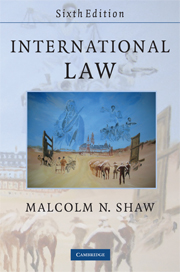Book contents
- Frontmatter
- Contents
- Preface
- Table of cases
- Table of treaties and selected other international instruments
- List of abbreviations
- 1 The nature and development of international law
- 2 International law today
- 3 Sources
- 4 International law and municipal law
- 5 The subjects of international law
- 6 The international protection of human rights
- 7 The regional protection of human rights
- 8 Individual criminal responsibility in international law
- 9 Recognition
- 10 Territory
- 11 The law of the sea
- 12 Jurisdiction
- 13 Immunities from jurisdiction
- 14 State responsibility
- 15 International environmental law
- 16 The law of treaties
- 17 State succession
- 18 The settlement of disputes by peaceful means
- 19 The International Court of Justice
- 20 International law and the use of force by states
- 21 International humanitarian law
- 22 The United Nations
- 23 International institutions
- Some useful international law websites
- Index
6 - The international protection of human rights
Published online by Cambridge University Press: 05 June 2012
- Frontmatter
- Contents
- Preface
- Table of cases
- Table of treaties and selected other international instruments
- List of abbreviations
- 1 The nature and development of international law
- 2 International law today
- 3 Sources
- 4 International law and municipal law
- 5 The subjects of international law
- 6 The international protection of human rights
- 7 The regional protection of human rights
- 8 Individual criminal responsibility in international law
- 9 Recognition
- 10 Territory
- 11 The law of the sea
- 12 Jurisdiction
- 13 Immunities from jurisdiction
- 14 State responsibility
- 15 International environmental law
- 16 The law of treaties
- 17 State succession
- 18 The settlement of disputes by peaceful means
- 19 The International Court of Justice
- 20 International law and the use of force by states
- 21 International humanitarian law
- 22 The United Nations
- 23 International institutions
- Some useful international law websites
- Index
Summary
The nature of human rights
The preamble to the Universal Declaration of Human Rights adopted on 10 December 1948 emphasises that ‘recognition of the inherent dignity and of the equal and inalienable rights of all members of the human family is the foundation of freedom, justice and peace in the world’. While there is widespread acceptance of the importance of human rights in the international structure, there is considerable confusion as to their precise nature and role in international law. The question of what is meant by a ‘right’ is itself controversial and the subject of intense jurisprudential debate. Some ‘rights’, for example, are intended as immediately enforceable binding commitments, others merely as specifying a possible future pattern of behaviour. The problem of enforcement and sanctions with regard to human rights in international law is another issue which can affect the characterisation of the phenomenon. There are writers who regard the high incidence of non-compliance with human rights norms as evidence of state practice that argues against the existence of a structure of human rights principles in international law. Although sight must not be lost of violations of human rights laws, such an approach is not only academically incorrect but also profoundly negative. The concept of human rights is closely allied with ethics and morality. Those rights that reflect the values of a community will be those with the most chance of successful implementation.
- Type
- Chapter
- Information
- International Law , pp. 265 - 344Publisher: Cambridge University PressPrint publication year: 2008
- 2
- Cited by



